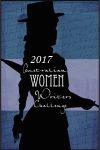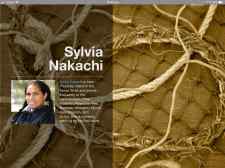Writing black: New indigenous writing from Australia is one of the productions supported by the Queensland Writers Centre’s if:book that I wrote about in a recent Monday Musings. It’s an interactive e-book created using Apple’s iBooks platform, and can be downloaded free-of-charge via the if:book page or directly from iBooks.
Writing black was edited (and commissioned) by Ellen van Neerven (whose book Heat and light and story “Sweetest thing”, I’ve reviewed here). It contains works by 20 writers, in a variety of forms, including prose by writers like Bruce Pascoe, Tony Birch, and Marie Munkara; poetry by Tara June Winch, Lionel Fogarty, Kerry Reed-Gilbert and Steven Oliver (most of which are presented in both text and video); and twitter-fiction by Siv Parker. For each writer, there is a “title” page which provides a brief biography, and the works are illustrated with gorgeous sepia-toned photography by Jo-Anne Driessens.
In her editor’s introduction, van Neerven states that, by the time of publication, there had not been a “digital-only anthology of Australian indigenous writing”. This book addresses that gap, but with a very particular goal. It was, she writes, “moulded by possibility”, by the fact that “the multimedia and enhancements a digital publication allows lifts the imagination”. Certainly, we see some of these possibilities in this production.
Her point, though, that particularly interested me was this:
Expectations of what we write about are changing, no longer the narrow restriction of life stories and poetry. Indeed, Indigenous writers do not need to write about Indigenous issues at all, if they choose not to. With more Indigenous books and authors comes a new generation of readers — open-minded to what Indigenous writers can write about, and across new forms and experiences.
Great point – just as it’s important that we see indigenous people on television and in movies, for example, without their indigeneity needing to be referenced or be part of the story. Anyhow, we see this broadening of content in Writing black – in Jane Harrison’s “Born, still”, for example – although, not surprisingly and completely understandably, given where we are on the reconciliation journey, many of pieces do have political intent.
This brings me to one of the appealing aspect of this production, which is its variety, not only in form as I’ve already mentioned, but in tone and content. The pieces span moods from the intensity of Tara June Winch (“Moon”) to the cheeky humour of Marie Munkara (“Trixie”), from the anger of Kerry Reed-Gilbert (“Talking up to the white woman”) and the frustration of Steven Oliver (“You can’t be black”) to the melancholy of Bruce Pascoe’s (“A letter to Barry”). Many of the pieces speak to loss of country and identity, and the emotional impact of these. What makes them particularly powerful is that they come from all over, from the tropical north to country Victoria to various urban settings.
Another appealing thing, which stems from its being an e-Book, is that we can hear poets perform their own work, as well as read the text ourselves. One of these is the new-to-me Steven Oliver. He has four poems in the collection – “Real”, “You can’t be black”, “Diversified identity” and “I’m a black fella” – with video of him reading each of them. He (or his poetic persona) is an urban dweller who regularly confronts questions concerning his indigenous identity. In “Real” he describes a discussion with another who refuses to accept he’s “black”, who produces those crass arguments like he’s “more of a brown” and “not really a full”, but who suddenly turns when our poet responds that his English name suggests he’s not “from here”. Oliver writes:
Listen here Abo, you know-it-all coon
It seemed that my friend has spoken too soon
Just moments ago I was not the real thing
Yet now by his words my heritage clings
This is a long-ish poem, but is accessible. Its use of rhyming couplets provides a light touch that keeps the reader engaged while the actual words drive home a serious point about Aboriginal identity. I hope it’s taught in schools.
Another poem of his, “You can’t be black”, also addresses assumptions others make about what being Aboriginal is:
You can’t be black
When the media shows Aborigines they live on communities
And struggle with petrol, poverty and disease
So you can’t be black
If you’re black you wouldn’t have nice clothes on your back.
Oliver’s poems are made to be performed, as are those of the next poet Kerry Reed-Gilbert.
She also comes out fighting, with five poems. She writes of being in a bar, waiting for the racist slurs (“A conversation and a beer”), or of being exploited by people who only want to know her to further their own aims (“Talking up to the white woman”). She speaks in the voice of a white racist in “Because my mum said so” to show how racism is learnt through families. This is a particular concern of mine. I’ve seen schools trying their hardest to teach tolerance and respect – but that role-modelling at home is mighty powerful stuff.
Another well-established poet who has been politically active for decades is Lionel Fogarty. His two poems in this collection focus more on caring for country, on sharing the land, on passing knowledge on.
The prose pieces are, overall, more diverse. There’s Tristan Savage’s cheeky short film script, “Gubbament man” about Freddy the indigenous “discrimination prevention officer”. Siv Parker’s twitter-fiction piece “Maisie May” was originally released as tweets over several hours on, note, 26th January, in 2014. It tells of a trip to country for the funeral of Aunty Maisie May who “could tell you about country and our ways that we lost over the years.” Marie Munkara is here too with her particular brand of humour to tell about “Trixie” who takes revenge on her ex. There’s also Tony Birch whose “Deep rock” clearly draws from (or fed into) his novel Ghost River (my review). And there’s David Curtis whose “What kind dreaming” tells of three young indigenous men, two already becoming familiar with the life and law of their country and the other a greenhorn from the city, who go bush. Our greenhorn soon learns a few things from the other two, who respect “them old people”.
In an interview in Sydney Review of Books, Ellen van Neerven comments briefly on why she wanted to do this “digital collection”:
For me it’s as much about audience and access. There is a really hungry international audience for Indigenous writing but also lots of roadblocks in getting the books out there. Being able to access work online is definitely an advantage and we’ve had a lot of feedback and contact from people overseas who have been able to find out about Indigenous writing and read content from 20 different authors that way.
And that’s exactly it. This oh-so-rich collection introduces readers to many of Australia’s current significant indigenous writers, not to mention the range of issues that interest them. And it’s free to download. That we should be so lucky! A big thanks to if:book and the Queensland Writers Centre for supporting such innovative and sophisticated projects as this one.
 Ellen van Neerven (ed.)
Ellen van Neerven (ed.)
Writing black: New indigenous writing from Australia
State Library of Queensland, 2014
133pp.
ISBN: 9780975803059

Alas, I can’t find this for Android 😥
That’s a shame Neil. They said it was created for the i-Books platform so I rather suspected it was not going to be available in other platforms. A huge pity though.
Thank you, I’m downloading it now on my iPad. I love the idea of spoken poetry as well as written words.
Great Anna, the spoken poetry is really wonderful. I have a couple of apps – TS Eliot ‘s the wasteland and Shakespeare’s sonnets – containing written and spoken poetry and they are the best. I’m sure you’ll like this book.
I’m interested to see Siv Parker’s name there. I’ve read most of the names you mention, including Siv, and I wonder if you can see from her bio if she’s had anything else published (in print, please!) since Nightwalkers in the Review of Australian Fiction? Definitely a writer to watch IMO, see https://anzlitlovers.com/2015/08/29/nightwalkers-by-siv-parker/
Thanks Lisa. What it says in the bio about Siv is that she won the 2012 David Unaipon Award, and has been published in The Guardian and Koori Mail. Doesn’t mention Review of Australian Fiction but that could be because it was published after this book (presuming your 2015 post was written close to its publication).
The Unaipon includes a publishing deal, doesn’t it? I’ll scout around…
Yes I think it does, with UQP… BUT I’ve been so busy the last 24 hours I didn’t check.
Ah…#FreshFromAGoogleSearch 2012 was the year that That Fool shut down the Qld Premier’s Lit Awards. Perhaps that knocked the stuffing out of the funding for publication.
Ah, that must be it because I’m sure there’s usually a deal with UQP. Darn it.
What an excellent project! I just wish they hadn’t restricted it to ibooks. I’m an Android user.
Yes, it is a shame because it’s a wonderful work and provides such a good introduction to indigenous writers and writing. You’d think it might have been possible to convert it, but maybe not or maybe they had some Apple sponsorship (though I don’t see that mentioned on the site or the book, so …)
Enjoyed the review, but frightening that pen (or printing press) and paper are being replaced by proprietary platforms.
Ah, yes, fair point Bill, though I guess I’m not frightened yet. Issues like this have always attended media changes. Just think, in my time, VHS vs Beta. Some productions were presented in both, others in only one and if you had the other one you couldn’t access the production. It think it’s worth making the point – and I’m glad you did – but I’m more phlegmatic about the long term (at the moment anyhow.)
Pingback: Short Stories Round Up – Australian Women Writers Challenge Blog